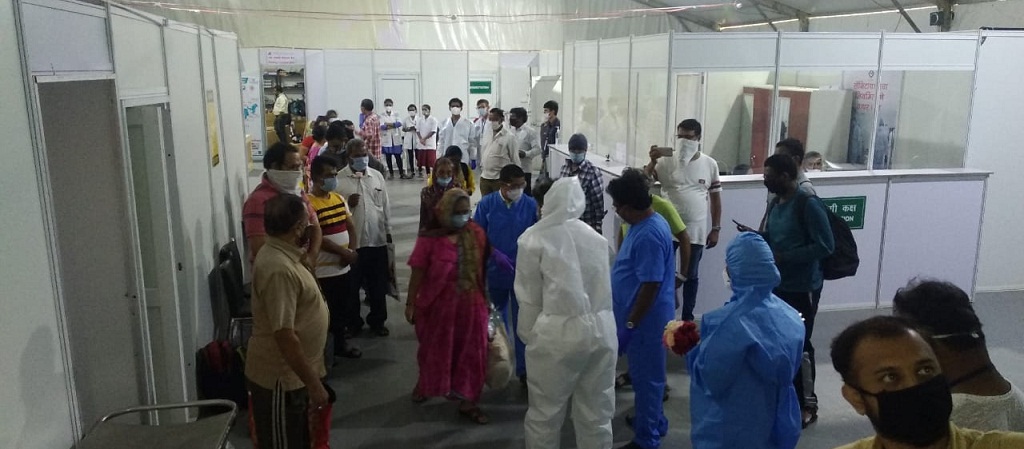Psychological Impacts Of The COVID-19 Outbreak, Implementation Of Community-Based Strategies To Ensure Mental Wellbeing

Shikha Chaurasia
Pune, December 10, 2020: With 68.3 million cases around the globe, the COVID-19 pandemic has affected a huge chunk of the human population. During these tough times, it is normal for people to sometimes feel gloomy as we are not used to this scenario.
The COVID-19 outbreak has not only caused a socio-economic crisis but it has also caused psychological distress amongst people. With various kinds of social activities coming to a halt and the healthcare workers suddenly receiving thousands of critically ill COVID-19 positive patients, emotional distress was felt by both, the public as well as the frontline workers. People are still in the recovery stage of dealing with the emotional distress caused due to the pandemic and its consequences.
Most prominent psychological reactions to the COVID-19 outbreak:
1] Uncontrolled fears related to the infection– During an epidemic or a pandemic, the most common and widely reported reaction is to have aspecific or uncontrolled fears. The people most likely to experience these kinds of feelings are the ones who have been exposed to the risk of the infection. They develop fears of contracting the infection and pervasive fears about their health. They also worry about infecting others especially family members. These feelings are at their peak when the person starts experiencing any of the physical symptoms related to the infection.
Several studies have also reported that pregnant women and individuals with children are more vulnerable to develop fears of getting infected or transmitting their infection to their children.
2] Widespread anxiety– During the pandemic period, due to lower social support, separation from loved ones and loss of freedom, many people suffer from feelings like uncertainty for the future, boredom and loneliness. These feelings may later amount to severe conditions like anxiety, insomnia, depression and post-traumatic stress.
Due to anxiety, it has been observed that the healthcare workers suffer from fatigue which results in reduced performance. While due to boredom and loneliness, the people are more likely to feel frustrated, angry, sad or depressed.
3] Helplessness and suicidal behaviour– In some cases, it has been observed that due to the restrictions on social activities and the economic distress caused due to the pandemic, people develop feelings like frustration, boredom, anger, loss of usual habits and most importantly hopelessness due to confinement or due to the disruption in their socio-economic life. These feelings when going unnoticed or unexpressed, it surmounts to extreme psychological tendencies and the person may start exhibiting suicidal thoughts.
4] Collective Hysteria– The final effect of widespread anxiety, loneliness and boredom can have long term negative effects on the emotional well-being of a person.
A person may feel extremely isolated which may cause them to suffer from collective hysteria, panic attacks and anxiety. As an outcome of the blow caused to the emotional and mental well-being, the person may lose their sense of purpose and may resort to alcohol or drug abuse. Excessive consumption of alcohol/drugs may make the person violent due to which an increase in the cases of domestic violence was observed during the lockdown.
Preventive Measures: Various strategies should be implemented at the community level to reach out to a large section of the population. Important measures which should be implemented are-
· Ensuring effective communication.
· Providing effective and immediate psychological services for relief.
· Health education should be enhanced with the help of online platforms.
· The feelings of social fear should be addressed and eliminated by the concerned authorities.
· Stigma and discrimination which comes as a consequence of an outbreak should be recognized, addressed and dealt with.
· People should be regularly informed and educated about prevention and health care protocols.
· Healthcare professionals should be provided with adequate protective facilities, equipment and counselling if needed.
· The scientific community, with the help of online platforms, must reach out to the people who are suffering from the psychological impacts of the pandemic.
· Internet access, telephone helplines, social networks and forums must be strengthened to reduce the feeling of social isolation, loneliness, anxiety and boredom.
Some helplines across India to deal with the mental health crisis during the pandemic:
1. The National Institute of Mental Health and Neuro-Sciences (NIMHANS): 08046110007
2. Mumbai-based mental health organisation mPower and the government of Maharashtra and BMC: 1800-120-820050
3. Poddar Foundation and Rotary Club of Bombay: 1800-121-0980
4. Assam Police and the Department of Psychiatry, GMCH and Clinical Psychologists/psychiatric Social Workers: 6026901053/54/55 or 6026901056/57/58.
5. The Central government has created a helpline number (1800-599-0019) called ‘Kiran’





